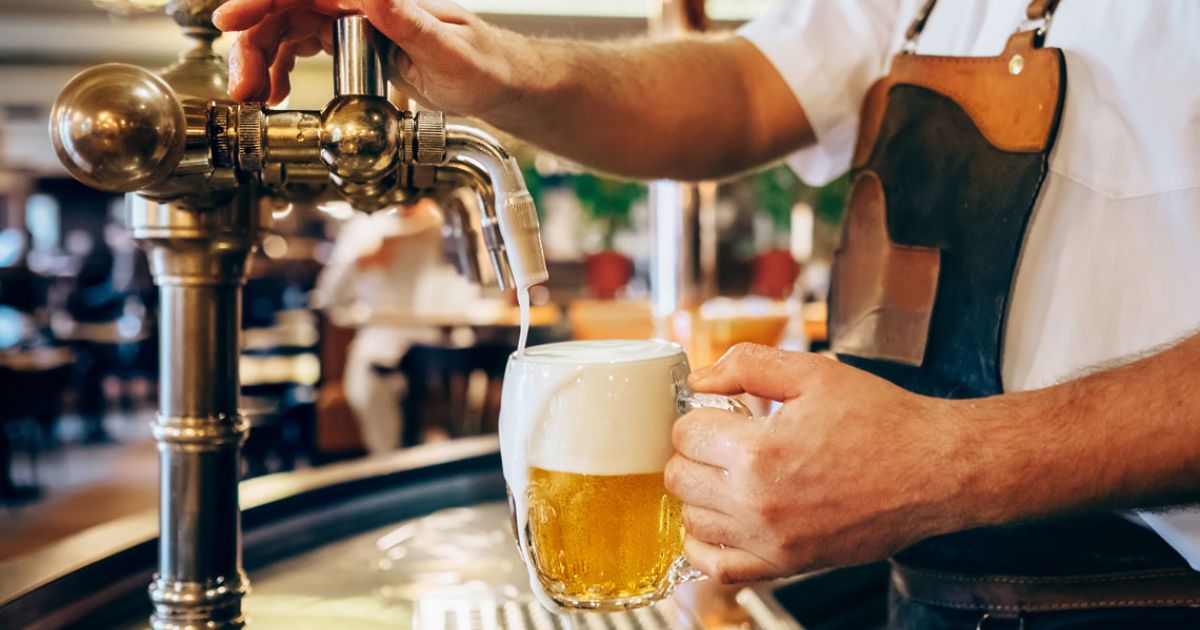In recent years, Brussels has seen an explosion in craft beer production, turning the niche brewing sector into a serious player for beer aficionados. The pandemic threatened to bring this booming business to a screeching halt, but the newbie brewers have found ways to survive.
It took ten years for Brussels to earn a place on Belgium’s beer map. That might sound odd. After all, we are talking about the capital city of the country that is, perhaps, more synonymous with beer than any other.
But Brussels somehow lost its brewers. Once host to the biggest brewery in the world, by 2010 its last remaining beermaker was Brasserie Cantillon. This is the city’s oldest brewery, created in 1900, and its gueuze is particularly special: when you drink it, you literally drink a little bit of Brussels, because it is a beer made by the “spontaneous fermentation” of yeast in the air of Brussels. Today, the brewery is a ‘living museum’ where you can see a process that dates back more than a century, using a copper pot and wooden barrels. Yet despite the quality of its range, Cantillon remains a niche brand.
The first 21st century breakthrough in the Brussels beer scene came with Brasserie de la Senne in 2010, named after the city’s subterranean river and a trailblazer for the local marketing trend set to boom a few years later. Their small range of classic beers were tasty, unusual and bitter, but the brewery had to fight to find a market. There were no distribution channels or even customers, at first, for a local beer. La Senne faced strong competition from established brands that enjoyed monopolistic retail contracts with most bars and cafés.
Hospitality sales are vital to small brewers. “Contrary to what many people think, the main outlet for local and craft beers is not direct sales but cafés and bars,” explains Florian Piette, founder of Beercrush, an online shop for Belgian local and craft beers.
Piette has followed the sector’s explosive growth over the last three years. He calls himself a "beer geek” and one of his bestsellers is his annual advent calendar with 24 Brussels breweries’ beers. He is also the ultimate insider: before his current project he worked at the company that confirmed the awakening of the capital’s brewing sector: the Brussels Beer Project (BBP).
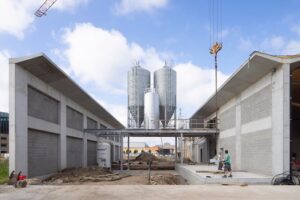
The Brasserie de la Senne takes shape
BBP's founders had no experience in brewing when they launched in 2013, but they were marketing geniuses. They generated a buzz pioneering marketing techniques like crowdfunding, community management, events, collaborations, social media and a permanent space to welcome fans. They embraced the steady gentrification of the old heart of Brussels and the craving for cool, offbeat products.
“Craft beers are much more expensive than industrial ones,” Piette explains. “The brewery explosion was fuelled by both Brussels’ consumers' high purchasing power and the rise of home brewing.” The stars aligned as the Brussels capital region actively began supporting the return of industry to town – continuing today with La Senne’s and BBP’s latest big brewery projects.
Outsourcing production
But BBP faced a hurdle: earning recognition from an older generation of brewers. When it started, it was more ‘beer project’ than ‘Brussels’ as all production was outsourced to outside the city. Back in 2013, two generations of brewers clashed and BBP founders were accused of betraying their fans by making them believe they were drinking a local beer. They have brewed their bestsellers outside Brussels while their installation at Rue Dansaert was used for smaller batches. Today, their 35,000-hectolitre brewery in Anderlecht, which began production in early 2022, definitively anchors them in Brussels.
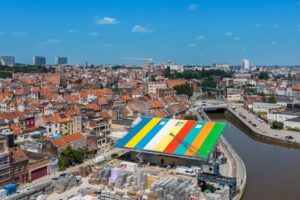
BBP's founders had no experience in brewing when they launched in 2013, but they were marketing geniuses. © BPP
Outsourcing production remains common in the beer sector. The leaders in contract brewing, De Proef and Anders in Flanders, make any beer you want. “But today, especially in the small world of microbreweries, transparency is a given,” Piette says. Bière de Quartiers, for example, is a Brussels brand with a wide range of classics (blonde, white etc) and craft beers (IPA, sour etc) that are linked to local neighbourhoods. But they make no secret of the fact that all their beers are contract-brewed by a Belgian artisanal brewery, such as En Stoemelings, the only one based in Brussels.
Arever, a small brewery in Evere, also sets aside part of its production capacity to brew for others such as Obaa. This small Schaerbeek brewery also brews its beers by contract in Wallonia, including an award-winning amber at the Brussels Beer Challenge in 2019. At L’Annexe in Saint-Gilles, the two founders have integrated their beers into a whole range of fermented drinks and also brew for Brewksel.
Kitchen start-ups
Most brewers start by experimenting in their kitchens, use contract brewers to produce their first batches, and brew themselves when they have enough cash to afford some material. This is the case for Brasserie Surréaliste, which launched operations in the Dansaert area, mixing a brewery, a taproom and a permanent art exhibition.
Drink-Drink!, a successful range of three organic craft beers, launched its experimental brewery in the Biestebroek area in Anderlecht. The microbrewery La Jungle opened at Studio Citygate in Anderlecht. Brasserie Witloof, a craft brand from Evere brewed initially in Walloon-Brabant, opened recently CoHop, a cooperative brewpub in Arsenal, Etterbeek, with other small brands 1B2T, Drinkthatbeer and Janine, a bakery that brews unsold bread-based beers.
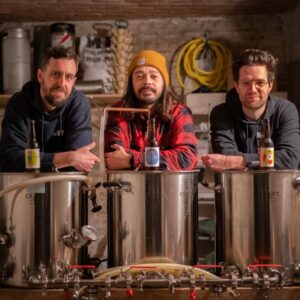
Credit: Cohop
All these brewers-in-the-making need to invest at least €100.000 upfront to make their dreams come true. It takes at least five years and a lot of sweat to launch a sizeable brewery. And there are hurdles. “Ten years ago, you could launch a brewery with an ok product. Today, it must be excellent, the standard is much higher,” Piette warns. Then comes the bottling, which takes up lots of space in a city where space is scarce and expensive.
Some Brussels brands are still contract brewing or renting installations. The IllegaaL brewery is a not-for-profit organisation that sells beers in cans to finance artistic projects. Gansbeek is created in Ganshoren but brewed near Courtrai with 100% Belgian ingredients. Bardaf! brews organic beer on contract at Lagneaux in Lasne. Brasserie Vandekelder was founded as a hobby by a group of friends who test their beers in their cellar in Brussels, then brew it in rented installations in Flanders and Brussels (e.g. at L’Annexe). Charity beer O’boy is brewed by Leopold7 near Namur, although its founders are from Brussels. One ‘Brussels’ brand, however, is clearly misleading: L’Abbaye de La Cambre is not brewed in Brussels but at Het Anker in Mechelen.
Genuinely Brussels
La Senne and BBP opened the floodgates for beers made in Brussels. However, the aptly-named En Stoemelings (literally ‘on the sly’) started at the same time as BBP, through its workshop near the Marché des Tanneurs kept a low profile. En Stoemelings has a strong Brusseleir identity with more classical beers: blond, black, pils, hopped, etc. “BBP and En Stoemelings are good examples of two possible founders’ profiles: marketing/business or craftsmen,” says Piette.
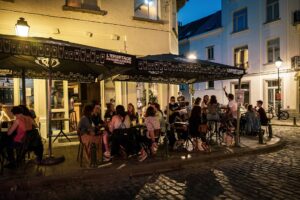
L’Ermitage
L’Ermitage and La Source did not need any marketing. They generated hype overnight thanks to the stunning quality of their products. “These breweries don’t need salesmen: their beers speak for themselves. Even as a retailer, I have to fight to get them in my catalogue,” Piette says. La Source invested in cutting-edge technology to launch Brussels' first brewpub, and also started selling its beers in cans. “There’s still a debate over canned vs bottled beer. But beers in cans are perfect for e-commerce and postal delivery,” Piette says.
No Science, based at Greenbizz in Laeken, is another example of a nano-brewery focused on product rather than marketing. The owner, a former employee of Moeder Lambic, brews the best porter and stouts in town. H2O too, is a discreet brewery in Evere owned by a passionate beermaker, whose three top-notch beers are distributed at just a handful of outlets in Brussels and elsewhere.
Quest for a market
Given the number of new microbreweries in Brussels, you may think there is a big market for small brands. But this is far from the case. “We are talking about a niche market,” Piette points out. Most production targets beer geeks in specialised bars (and increasingly, specialised shops - see box). While more and more restaurants offering trendy, local food are putting local craft beers onto their menus, this market has yet to take off. “It is shocking to get industrial beer in a restaurant where the food is excellent. If you are on a quest for great taste, it should be everywhere: in the food, the wine and also the beer,” Piette fumes.
Every brewery has its own business model which will shape its resilience as we emerge from the pandemic. For example, BBP targets both the general public and beer geeks by selling its classics in supermarkets on the one hand and entertaining a community of aficionados on the other. It caters to the connoisseurs with cool events - including a private festival with guest breweries called ‘Wanderlust’ - and a taproom with new creations brewed on-site. Its new bar on the corner of Ave Louise and Rue du Bailly – taking over the old Michael Collins pub – is also helping cement its position. BBP has thus ducked craft brewers’ typically high dependency on cafés and bars.
This is also the case for Beerstorming, a tiny brewery in Saint-Gilles, where you can learn to brew your own beer (and make up to 100 litres of it). It holds a regular in-house contest where wannabe brewers’ creations are assessed by a jury of beer lovers. The winners are brewed under contract and sold at an impressive list of local outlets including supermarkets, shops, bars and restaurants.
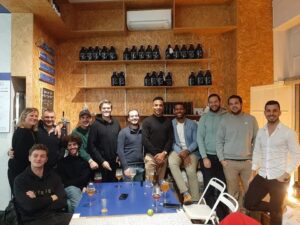
Credit: Beerstorming
Since the hospitality sector is no longer a reliable outlet, small brewers have had to rely on e-commerce and solidarity from colleagues and fans. “But the problem of online distribution is that it is a fundamentally different job than brewing,” Piette explains.
This additional task can eat up the margins of those who work with contract brewers. To live from your brewery, you must either have a strong brand and/or be good at finding outlets. Yet local brewers are hampered by their naturally limited local customer base which cannot be expanded overnight. And it is why many breweries, such as Brasserie de la Senne and En Stoemelings, started working with supermarkets during the pandemic.
The huge drop in demand in 2020 and 2021 hit Brussels’ small brewers hard. Most have benefitted from solidarity within the community, but that is a finite resource. The pandemic may have identified new business models, but the market fundamentals are unlikely to change: the thirst for local and premium products, the buzz around home brewing, and the need to re-industrialise urban areas.
Where to find Brussels beers
Shops: Malt Attacks and Dynamo (Saint-Gilles); Le Barboteur (Schaerbeek), Malting Pot (Ixelles); Belgopop (Jette); Dekkera (Forest); Brussels Beer Box (online).
Bars: Moeder Lambic and L’Ermitage (Saint-Gilles); l’Amère à boire (Ixelles, Uccle and Saint-Gilles); Python (Schaerbeek), and beer-loving restaurant Nuetnigenough (Brussels).
Festivals: BXLBeerFest; Swafff; Wanderlust

